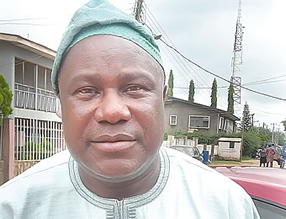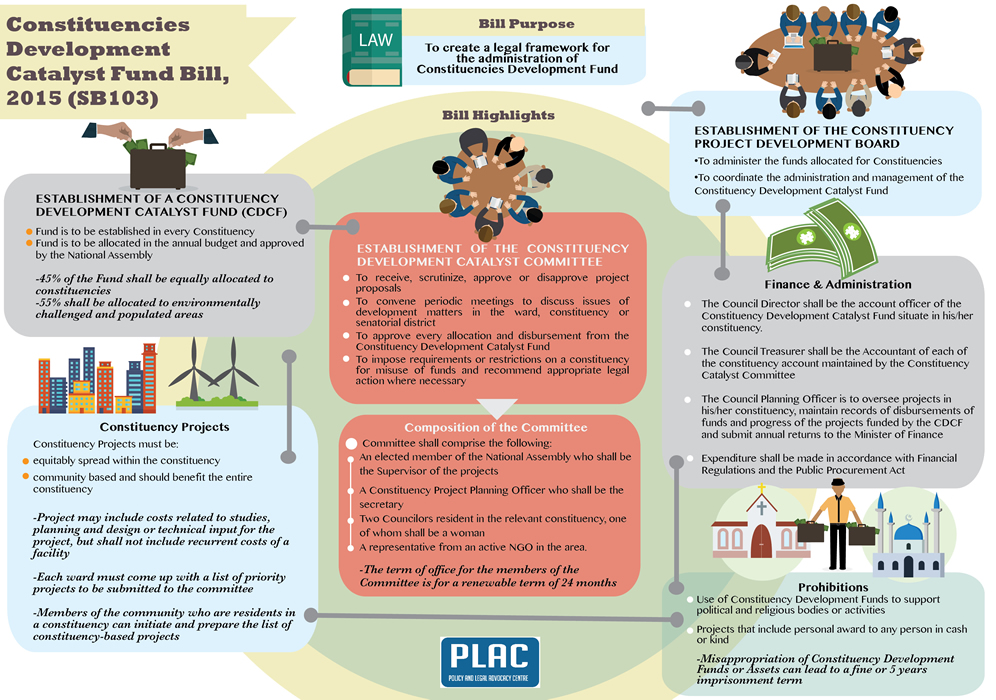SB 103: Constituencies Development Catalyst Fund Bill 2015
Download Bill Bill Analysis Download Bill Analysis Infograph
Sponsor:
Sen. Buhari Abdulfatai
State:
OYOParty:
ALL PROGRESSIVES CONGRESSBill Status: Reported out of Committee
- First Reading: 26/11/2015
- Second Reading: 09/06/2016
- Committee Referred To: Committee on Poverty Alleviation
- Consolidated with:
- Date Reported out of Committee:23/05/2017
- Third Reading:
- Reconsidered and Passed:
Bill Analysis:
SHORT TITLE
Constituencies Development Catalyst Fund Bill, 2016. The Bill is sponsored by Sen. Buhari Abdulfatai.
OBJECTIVE OF THE BILL
The objectives of the Bill are not explicitly stated. However, it can be implied that it intends to create a legal framework for Constituencies Development Funds.
NUMBER OF CLAUSES/PARTS
The Bill is divided into 8 parts. It has 28 clauses and two schedules.
CONTENTS
The Bill has the following contents: -
- Part I: - Preliminary Provisions
- Part II: -The Constituencies Development Catalyst Fund
- Part III: - Constituencies Development Catalyst Committee
- Part IV: - Constituency Projects Submission List
- Part V: - Submission, Scrutiny and Implementation of Projects
- Part VI: - Types of Projects
- Part VII: Finance and Administration
- Part VIII: Miscellaneous
- First Schedule – constituency project submission list template
- Second Schedule –standard project description fund template
HIGHLIGHTS OF THE BILL
1. Application of bill/Jurisdiction: The bill will apply to all Federal Constituencies in Nigeria.
2. Administration and Management:
a) Establishment of Constituencies Development Catalyst Fund-
Clause 4 establishes a Constituency Development Catalyst Fund (CDCF) in every electoral constituency. The fund is to be allocated in the annual budget appropriated by the National Assembly for each financial year (clause 5). In addition, the funds shall be allocated on the following criteria
(i) that 45% shall be equally allocated to each constituency; and
(ii) that 55% goes to environmentally challenged and populated areas.
b) Establishment of the Constituency Project Development Board- Clause 4 also establishes a Constituency Project Development Board who are to administer the funds allocated for Constituencies. Charges and expenditure from the fund shall be made in accordance with financial regulations, the Public Procurement Act, as well as other provisions in the bill.
c) Constituency Development Catalyst Committee – Clause 10 establishes a Constituencies Development Catalyst Committee, which shall have a maximum number of seven persons. Members of this Committee shall include an elected member of the National Assembly who shall be the Supervisor of the projects, a Constituency Project Planning Officer who shall be the secretary, two Councilors resident in the relevant constituency, one of whom shall be a woman, and a representative from an active NGO in the area. The last two are to be nominated by councilors, ward executive officers and councilors within the respective constituencies.
The elected representative of the National Assembly is responsible for the convening of periodic vocational meetings to discuss issues of development matters in the ward, constituency or senatorial district.
The term of office for the members of the Committee is for a renewable term of 24 calendar months subject to exceptions stated in the Bill. However, where the exception applies, the list of projects is sacrosanct and cannot be changed. Some of the duties of the Constituency Development Catalyst Committee include receiving, scrutinizing, approving or disapproving project proposals from the wards. It is also charged with the responsibility of approving every allocation and disbursement from the Constituency Development Catalyst Fund.
The Committee also has powers to impose requirements or restrictions on a constituency for misuse of funds and can recommend appropriate legal action in this instance.
d) The Minister of Finance – Under clause 17(1) of the Bill, The Council Planning Officer is to submit annual returns to the Minister of Finance no later than 60 days after the end of every financial year. That is a period of twelve months ending on 30th June. The Minister is empowered to make regulations for the management and smooth running of the CDCF
e) Council Director- Under clause 21(2) of the Bill, the Council Director shall be the account officer of the Constituency Development Catalyst Fund situate in his jurisdiction. The Council Director must also approve the commercial bank where the constituency account shall be open under clause 22(1).
f) Council Treasurer- The Council Treasurer shall be the Accountant of each of the constituency account maintained by the Constituency Catalyst Committee.
g) Council Planning Officer: The council planning officer’s job is to oversee projects under his/her jurisdiction, maintain records of disbursements of funds and progress of the projects funded by the CDCF and submit annual returns to the Minister of Finance.
3. Allowable Projects under the Bill: They are not specifically indicated or listed, but the bill provides that they should be community based development projects with benefits that would be available to a wide section of inhabitants of the area in question. It may include costs related to studies, planning and design or technical input for the project, but shall not include recurrent costs of a facility. The bill specifically provides that the funds should not be used for supporting political or religious bodies or activities. Additionally, under clause 27, the funds received are deemed to be “complementary” to any other development projects financed by the Government and do not exclude the possibility of further funds from any other development programmes by the Government or any agency.
4. Offences and Penalties:- Under clause 28(1) of the Bill, any person who misappropriates, assists or causes anyone to misappropriate or apply funds or assets in a manner inconsistent with the provisions of the Bill commits an offence and shall be liable to a fine not exceeding fifteen million shillings or to imprisonment for a term not more than five years or to both.
ANY SIMILAR EXISTING BILL
There is a Constituency Projects (Budgetary) Provisions Bill, 2016 (SB. 321) sponsored by Sen. Stella Oduah that passed second reading on 8/12/2016 and is before the Senate Committee on Finance and Appropriations. There is also a Constituency Development Fund Bill (SB.336) sponsored by Sen. Ali Ndume that has passed first reading. Similarly, in the House of Representatives, there is a Constituencies Development Fund Bill, 2015 (HB.330) sponsored by Hon. Solomon Ezinwa (HB. 330) that passed second reading on 02/06/2016 and is before the House Committee on Constituency Outreach and Finance.
OBSERVATIONS/ QUESTIONS RAISED BY THE BILL
- It is submitted that the objectives of the bill would be better stated
explicitly rather than being inferred. This will enable one understand the context of the operating powers of the Constituent Development Catalyst Committee with regards to clause 11(c) that gives the aforementioned Committee omnibus powers.
- Although the Constituency Project Development Board is stated as the body to coordinate the Constituency Development Catalyst Fund, (see clause 4(2), it is confusing as to whether this is an anomaly as the Bill is silent on their composition and functions.
- Clause 10(1) which outlines the composition of the Constituency Development Catalyst strangely requires that the NGO representative in the Committee be nominated by the same Committee. Furthermore, this clause goes on to add that the NGO representative as well as the two councilors be nominated by councilors, ward executive officers and councilors within the respective constituencies. The two provisions are apparently conflicting.
- The Bill does not explicitly state the percentage of the annual budget that will be allocated to the Constituency Development Catalyst Fund & merely refers to a portion of the Federal Annual Budget –see clause 2(2)
- Clause 5(2) of the bill states that 45% be equally allocated to each constituency; and that 55% goes to environmentally challenged and populated areas. The bill implies that this is a percentage of the allocated Fund. It should be properly qualified or explicitly stated.
- It is probable that the same clause 5(2) of the Bill that allocates a higher percentage of the Constituency Development Catalyst Fund to environmentally challenged areas and populated areas may be controversial, as the terms are not properly explained. The interpretation clause of the Bill is silent on the definition of “environmentally challenged areas and “populated areas”.
- Clause 5(6), which bars reallocation of funds from one project to another within the constituency during a financial year, could be restrictive. The implication here is that virement would not be possible where necessary or exigent. It could be redrafted to provide exceptions for situations where reallocation is necessary. For instance, where the implementation of a particular project becomes impracticable.
- The composition of the Constituency Development Catalyst Committee in clause 10 (c) mandates that one of the Councilors in the Committee should be a woman. What happens where no woman has been elected as a councilor in the relevant constituency?
- The Bill does not give the Committee guidelines as to how it will prioritize the list of constituency based projects initiated by members of the community who are resident in a constituency (see clause 12(1)). It is recommended that setting guidelines will not only foster transparency but enable the Committee arrive at a decision among competitive interests.
- The provision for a Council Director and Council Treasurer are somewhat disconnected from the Bill. Their qualifications, term of office and whether they are to be remunerated or not are also not stated. Also, the Bill is silent as to whether members of the Constituency Development Catalyst Committee will be remunerated. This should be clear.
- There might be issues on the practicability of running a project. This is because the financial year for the Constituencies Development Catalyst Fund runs for a period of twelve months ending on 30th June, yet the Constituency Development Catalyst Committee is at leisure to approve the projects compiled before the end of December each year. This could practically mean that a project may be allowed a period of only six months to be completed.
- Who is the district planning officer that appears in the first schedule of the Bill?
- The currency for the fine in clause 28(1) should be changed from shillings to Naira.
CONCLUDING ISSUES
Overall, the Bill is an attempt to provide a legal framework for constituency development projects and respond to recent public concerns on the misuse of constituency development funds. If enforced, its mechanism is likely to enhance citizen participation in the administration, management, monitoring and evaluation of funds that should bring about socio-economic development and empowerment.
Infographic:
